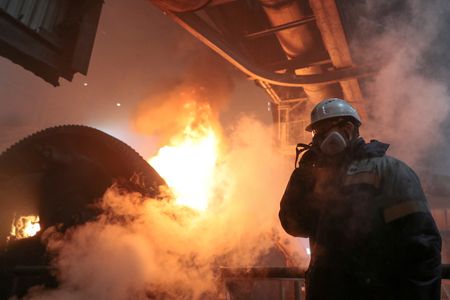 1
1 1
1


By John McCrank
NEW YORK (Reuters) – Wild swings in the prices of oil, metals and other raw materials generated more margin calls at trading firms on Tuesday, heightening worries that the volatility in commodities could spill over into broader markets as the war in Ukraine escalates.
Intercontinental Exchange Inc has seen margin calls at its clearinghouse due to a spike in volatility in the commodities markets following Russia’s invasion of Ukraine, the exchange operator’s chief financial officer said on Tuesday. Every margin call had been met “within an hour, if not less,” ICE CFO Warren Gardiner said at an investors conference held by Raymond James.
The increased margin calls – essentially requests to deposit extra funds with brokers – come amid supercharged volatility in raw materials prices after the invasion of Ukraine by commodities-export giant Russia sparked sanctions from the United States and it allies.
Prices for Brent crude are up more than 30% since the invasion began, while nickel prices doubled on Tuesday – a move that appeared to have been exacerbated by a Chinese firm covering bets against the metal and reducing its exposure to costly margin calls.
A broad range of other commodities, from metals like palladium and gold to wheat, have also seen big moves in recent weeks.
“We’re having an unprecedented shock that’s hitting basically all sectors of the commodity industry simultaneously,” said Craig Pirrong, a finance professor at the University of Houston, who is a futures market expert. “So far, the system has been able to absorb the stress, but it does raise cause for concern,” he said. “You could imagine scenarios where it could morph into a broader systemic effect.”
The margin calls have, in some cases, exaggerated already chaotic trading in markets. China’s Tsingshan Holding Group bought large amounts of nickel to reduce its short bets on the metal and its exposure to costly margin calls, turbocharging a rally that saw the price of nickel double to a record above $100,000 per tonne in a matter of hours on Tuesday, prompting the London Metal Exchange (LME) to halt trading.
On Monday, Peabody Energy said it posted an additional $534 million to satisfy margin requirements for coal hedge contracts since the end of December.
The company said it entered a $150 million credit facility with Goldman Sachs to support near-term liquidity requirements, and planned to sell up to $225 million of shares to repay debt.
(Reporting by John McCrank, writing by Ira Iosebashvili; Editing by Chizu Nomiyama and Sam Holmes)